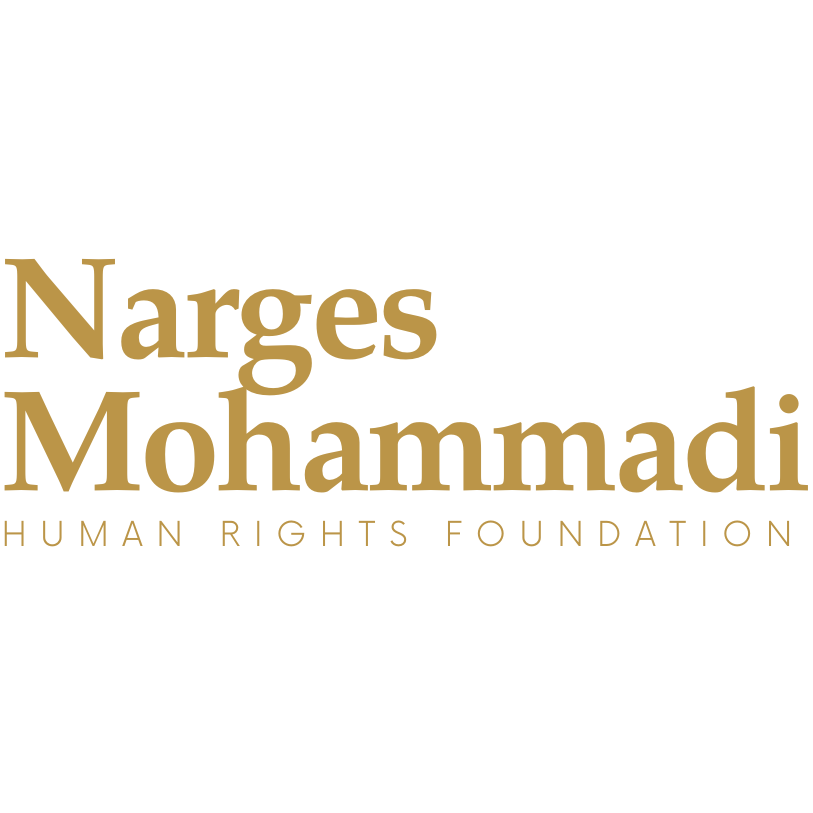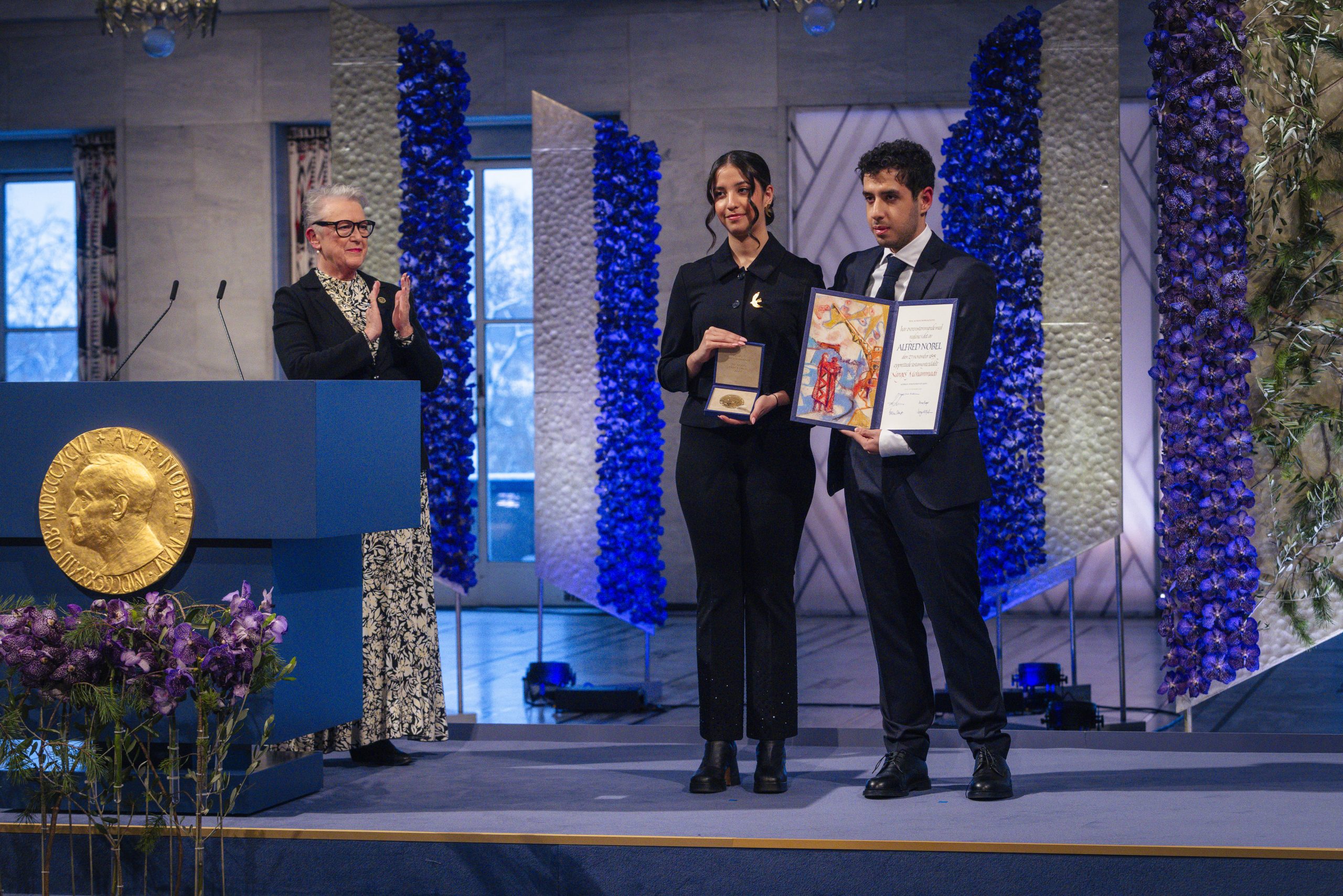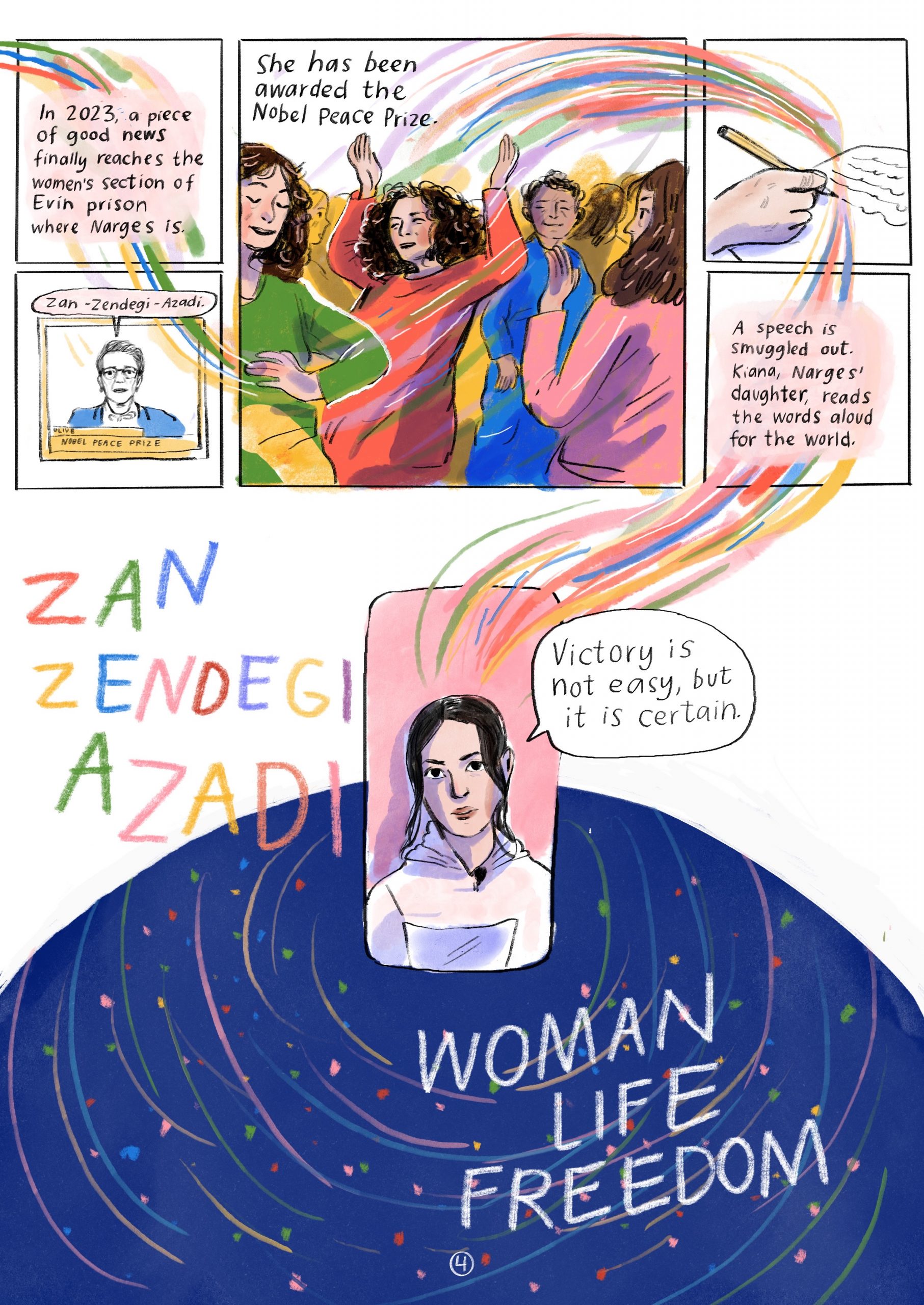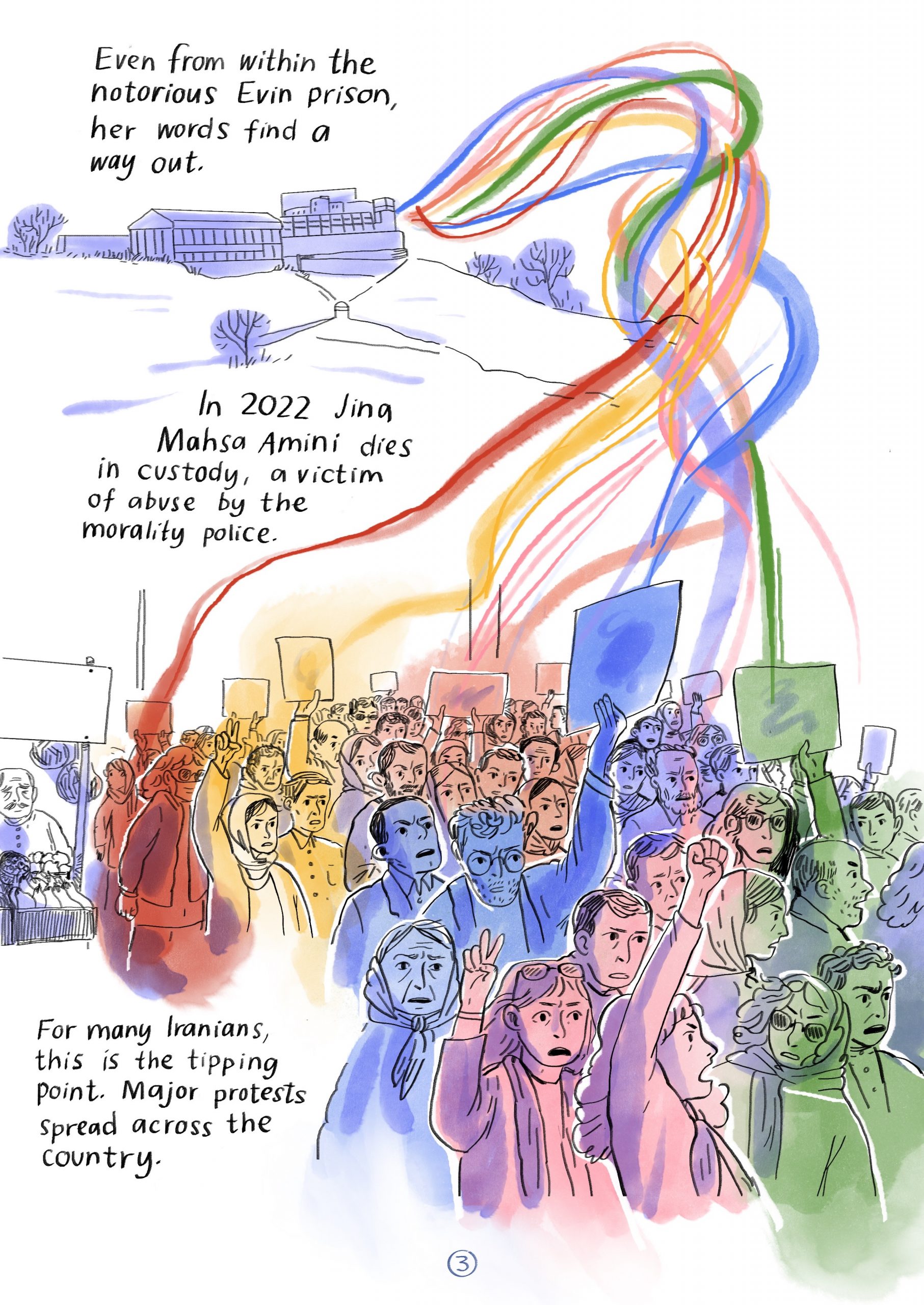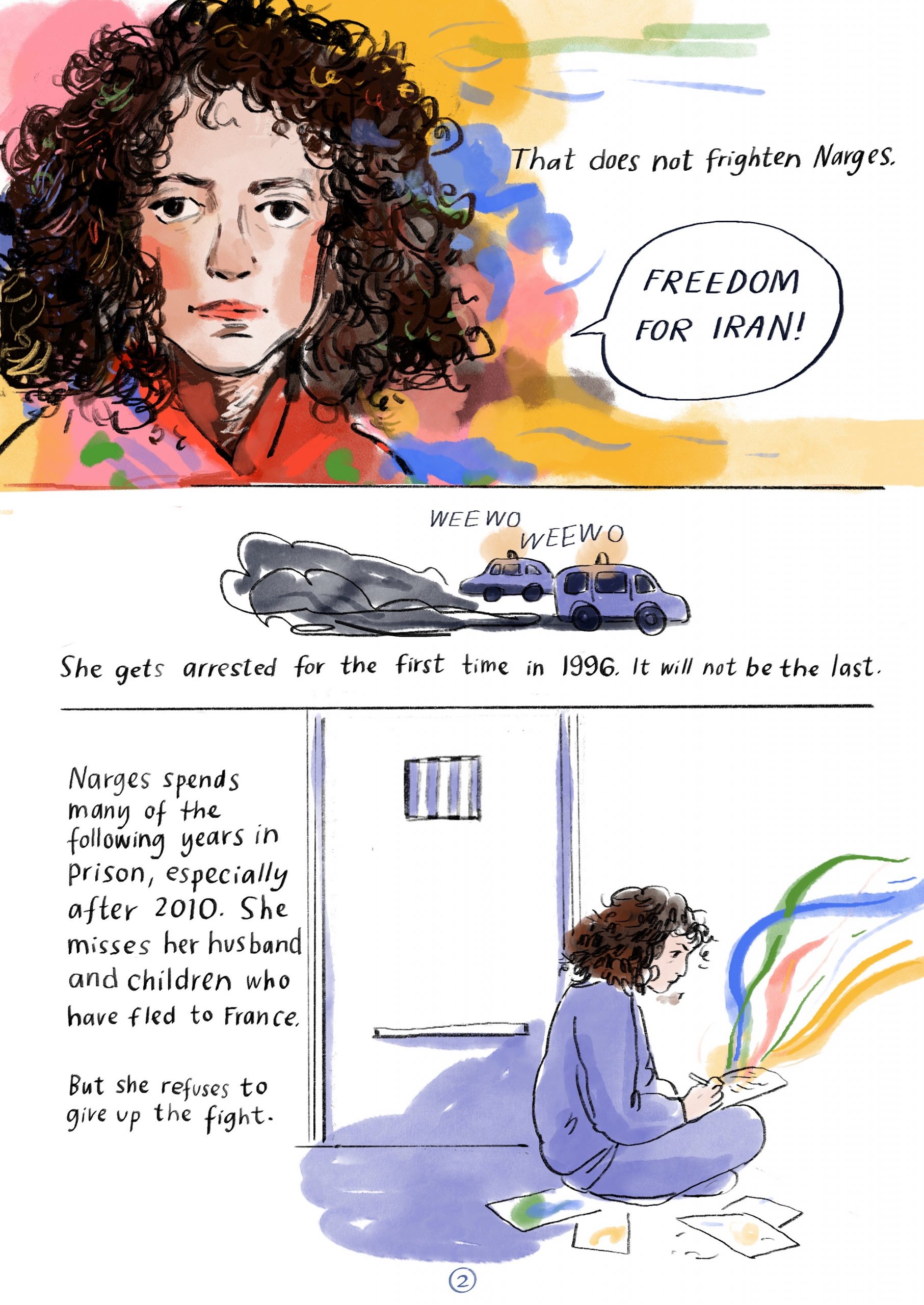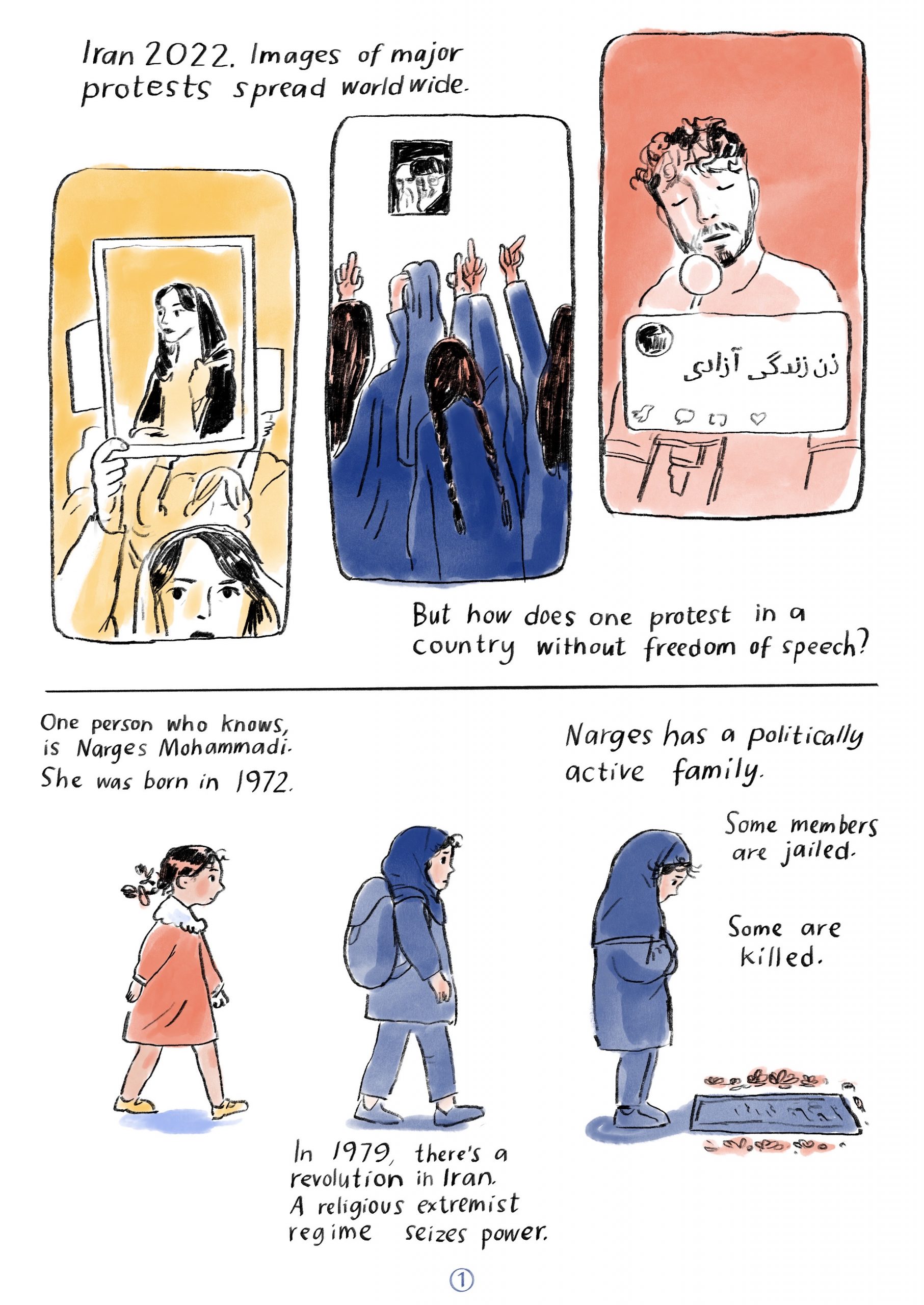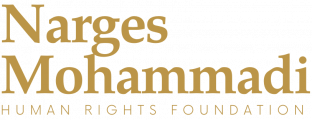Narges Mohammadi
Narges Mohammadi, born on April 21, 1972, in Zanjān, Iran,is a human rights defender, journalist, author. Founder and Director of Narges Foundation (Narges Mohammadi Human Rights Foundation) and deputy director and spokesperson of the Defenders of Human Rights Centre (DHRC) in Iran.
Mohammadi has spent more than 10 years of her life in prison, with her current period of detention starting in November 2021. She is currently serving sentences of 13 years and nine months in prison, on charges including committing “propaganda activity against the state” and “collusion against state security.” She has been arrested 13 times, has been tried 9 times, spent 135 days in solitary cells and has been sentenced to more than 36 years imprisonment and 154 lashes in her lifetime.
For over 20 years, Narges Mohammadi has been a leading voice against the death penalty and gender-based oppression in Iran. A committed feminist and human rights advocate, she has focused her work on challenging state violence, including executions, sexual abuse in detention, and discriminatory laws targeting women. From prison, she continues to write and speak out, calling for freedom of expression, the release of political prisoners, and a democratic, secular future for Iran.
She is the recipient of numerous international awards for her tireless struggle for human rights, including the 2023 Nobel Peace Prize, the 2023 UNESCO/Guillermo Cano World Press Freedom Prize, the 2023 PEN/Barbey Freedom to Write Award, and the 2022 Reporters Without Borders Prize for Courage.
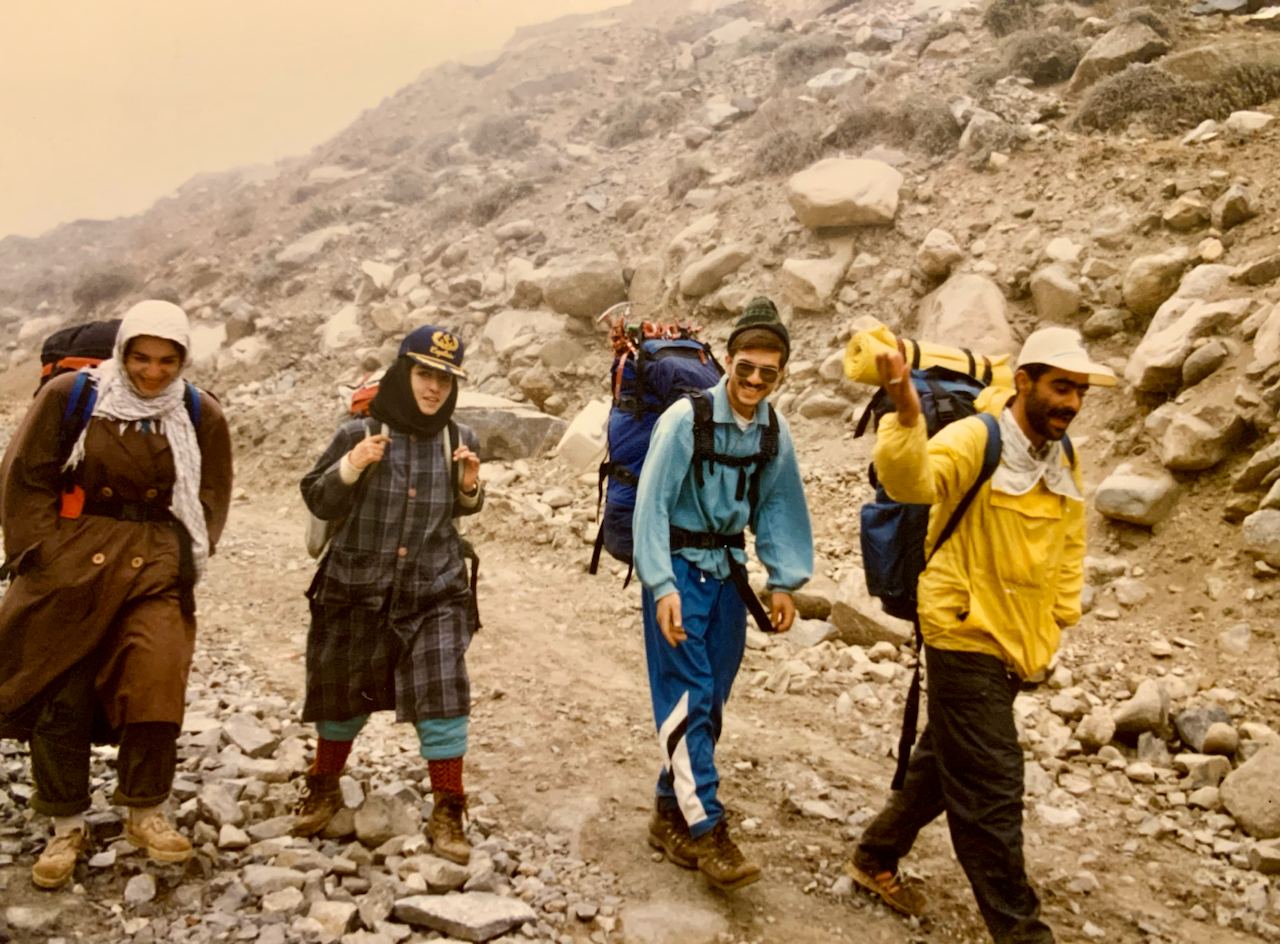
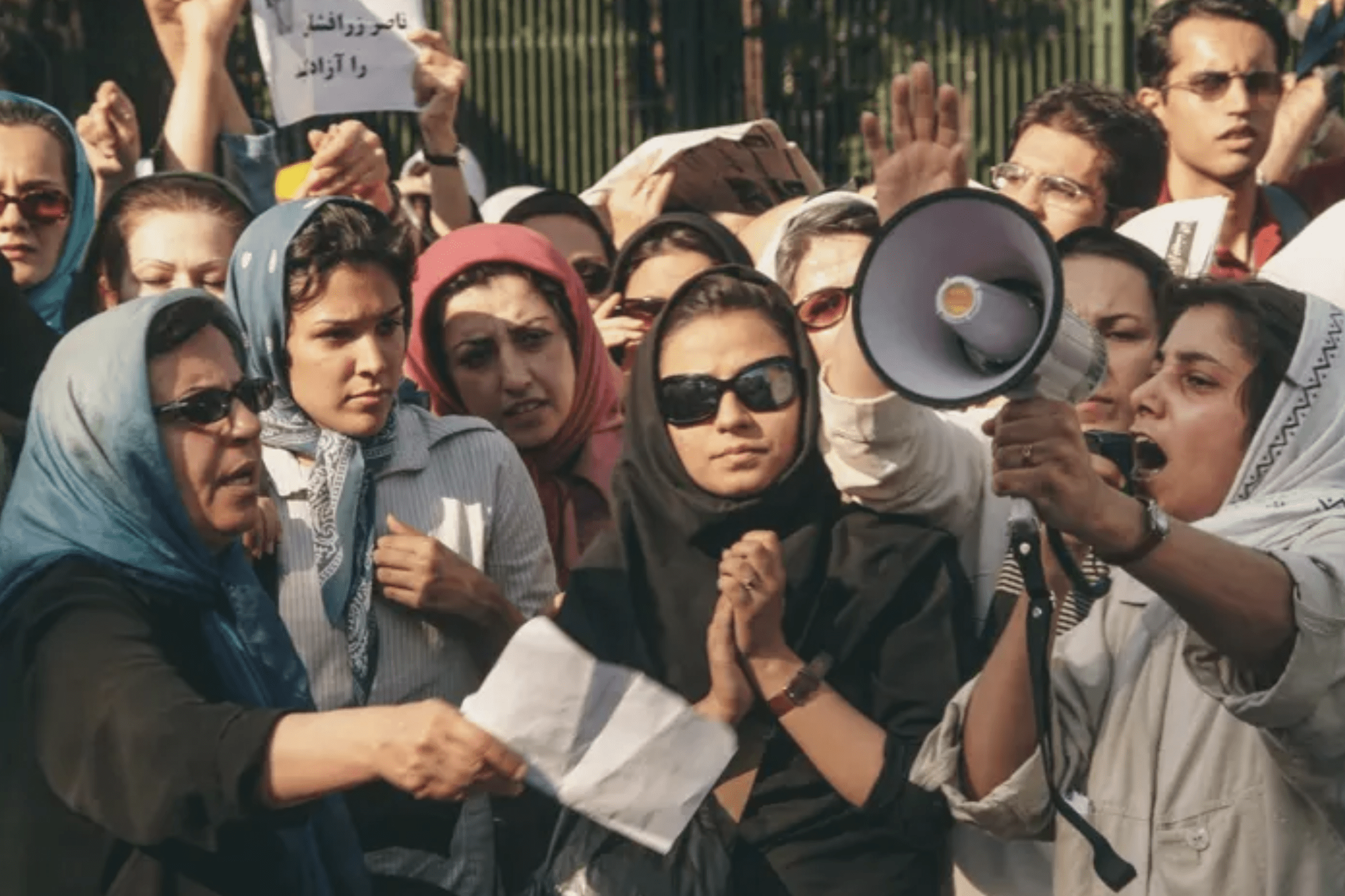
She studied physics at the International University of Qazvin where she began her activism and was arrested for the first time. She with the help of other students founded an independent student organization called “enlighteners” whose activism met with threats from the university and the pro regime groups many times. Not only did the Ministry of Science refuse to grant permission to “enlighteners” members to establish, but the insistence to continue their activities resulted in Narges being arrested twice. She also started a mountain climbing group in the university for the first time for women and men climbing together which was a taboo and against traditions at the time. Even under a lot of pressure she continued mountain climbing and climbed most of the mountains in Iran, including Damavand, Alam Kooh, Dena, ShirKooh, Shah Alborz and Taftan
Narges started journalism in 1996 by writing articles about the student’s movement and women’s rights movement in “Payam Hajar” a modern pro change magazine, where she became a member of the editorial board. Publication of her articles in other newspapers led to her membership in “Iran’s journalists” union later on.
She met Taghi Rahmani, a political activist who had spent many years of his life in prison in Qazvin in an underground political group discussion when she was a student. They married in 1998 and the result of their marriage was Ali and Kiana twins.
Due to her activism for women’s and human rights, Narges Mohammadi lost her job at a newspaper as a journalist in 1999, coinciding with a mass seizure of newspapers in Iran. After passing her qualification exam, she found work at the Iran Engineering Inspection Company, where she served as an engineering inspector on large industrial projects, including the Petropars Project. However, after nearly 10 years, she was dismissed from this position as well, following direct orders from authorities due to her involvement with the Human Rights Defenders Center, founded by Shirin Ebadi, after Ebadi won the Nobel Peace Prize in 2003. She later became a member of the supervisory council of the Human Rights Defenders Center and continued her work in the research committee of the Association for the Defense of Prisoners’ Rights.
She and her colleagues at the Human Rights Defenders Center established independent human rights institutions, including the Committee for the Defense of Free and Fair Elections, the Committee for Abolishing Death Penalty for Children, and the National Peace Council, which, with the membership of 82 political, social, civil, cultural, trade union and human rights leaders, is unique in the history of Iran.
Her activities for the release of the political prisoners and her fight against solitary confinement and death penalty resulted in her arrest in 2001. Her first experience of solitary confinement was during this arrest, when she was held in the solitary cells of the Ishrat Abad barracks of the IRGC. Consequently, she was sentenced to one year in prison.
In 2006, she gave birth to her twin children, Ali and Kiana.
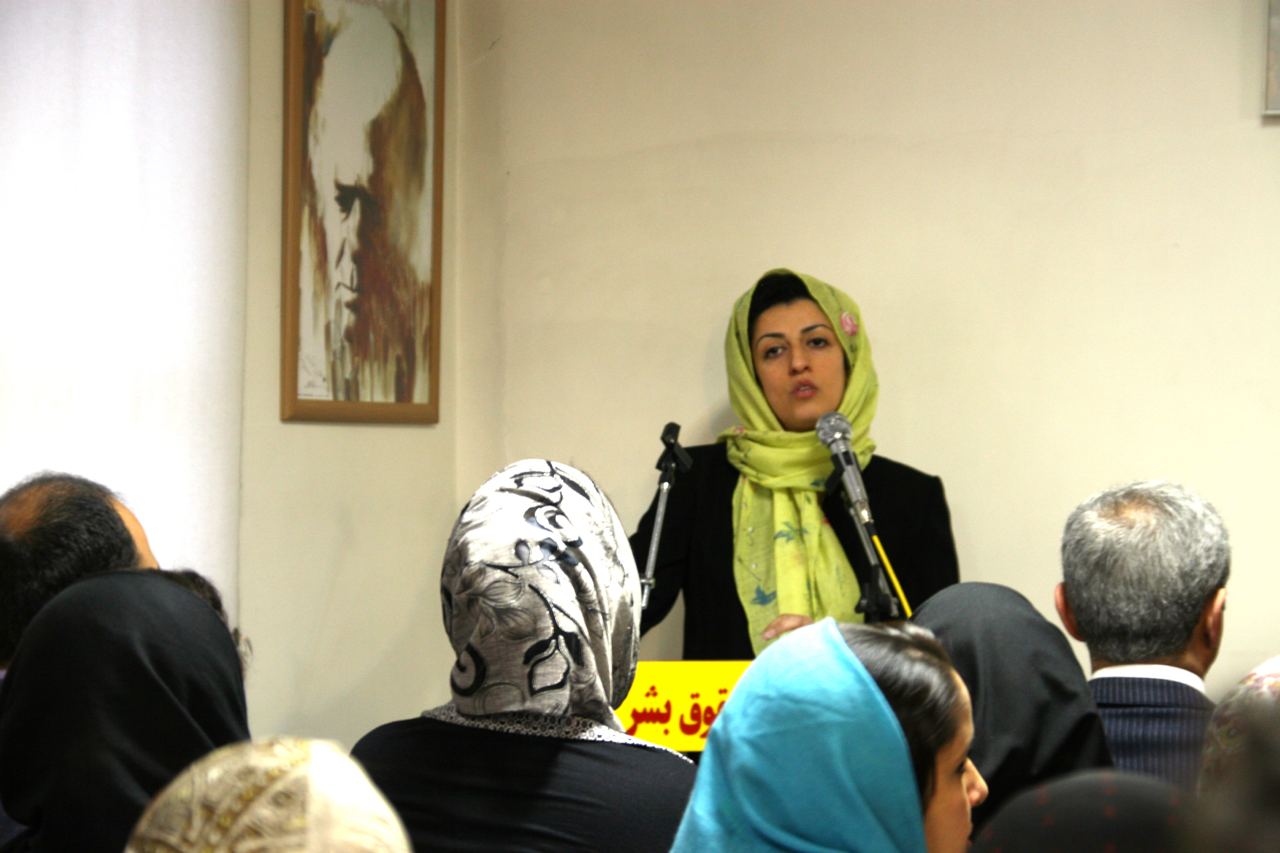
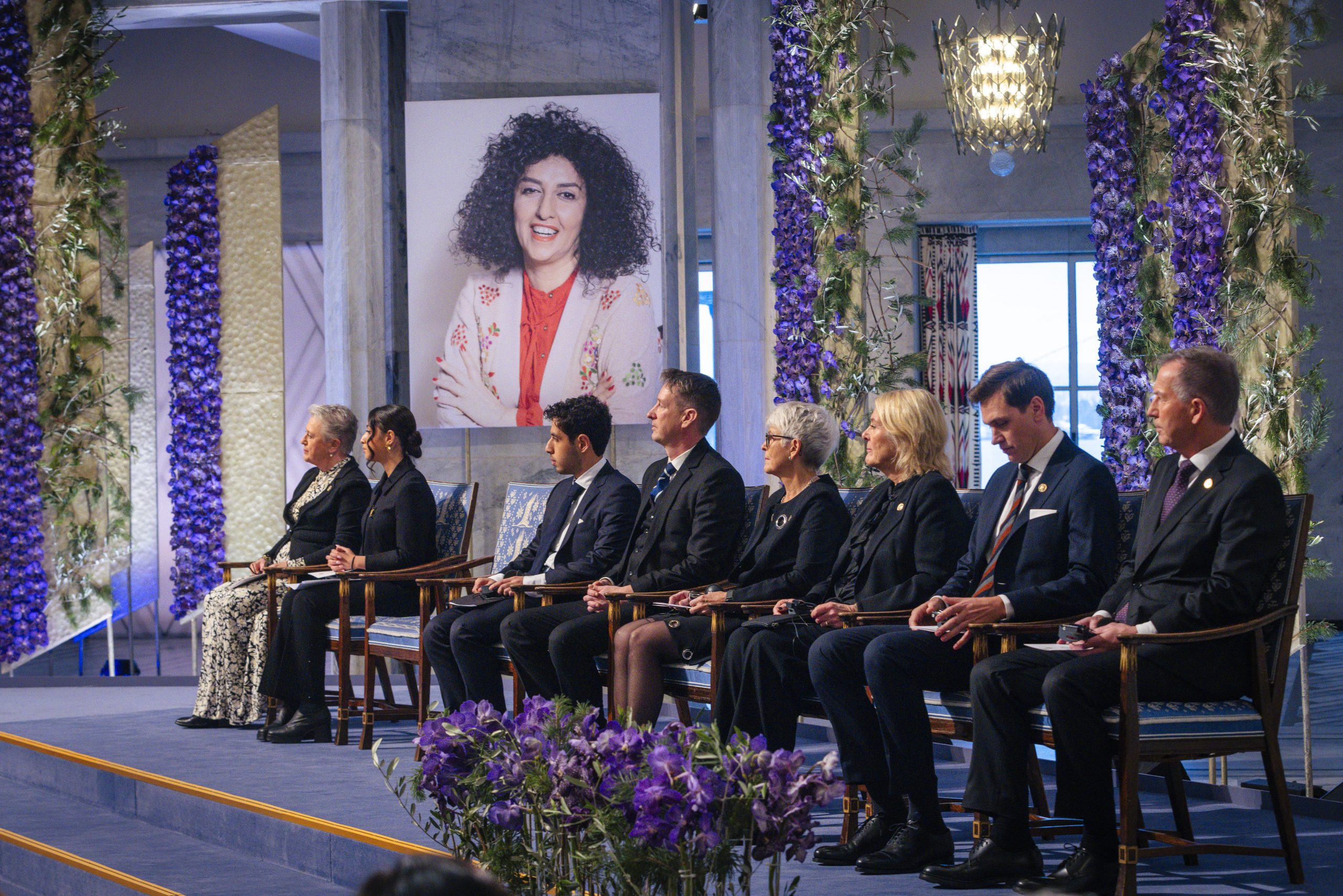
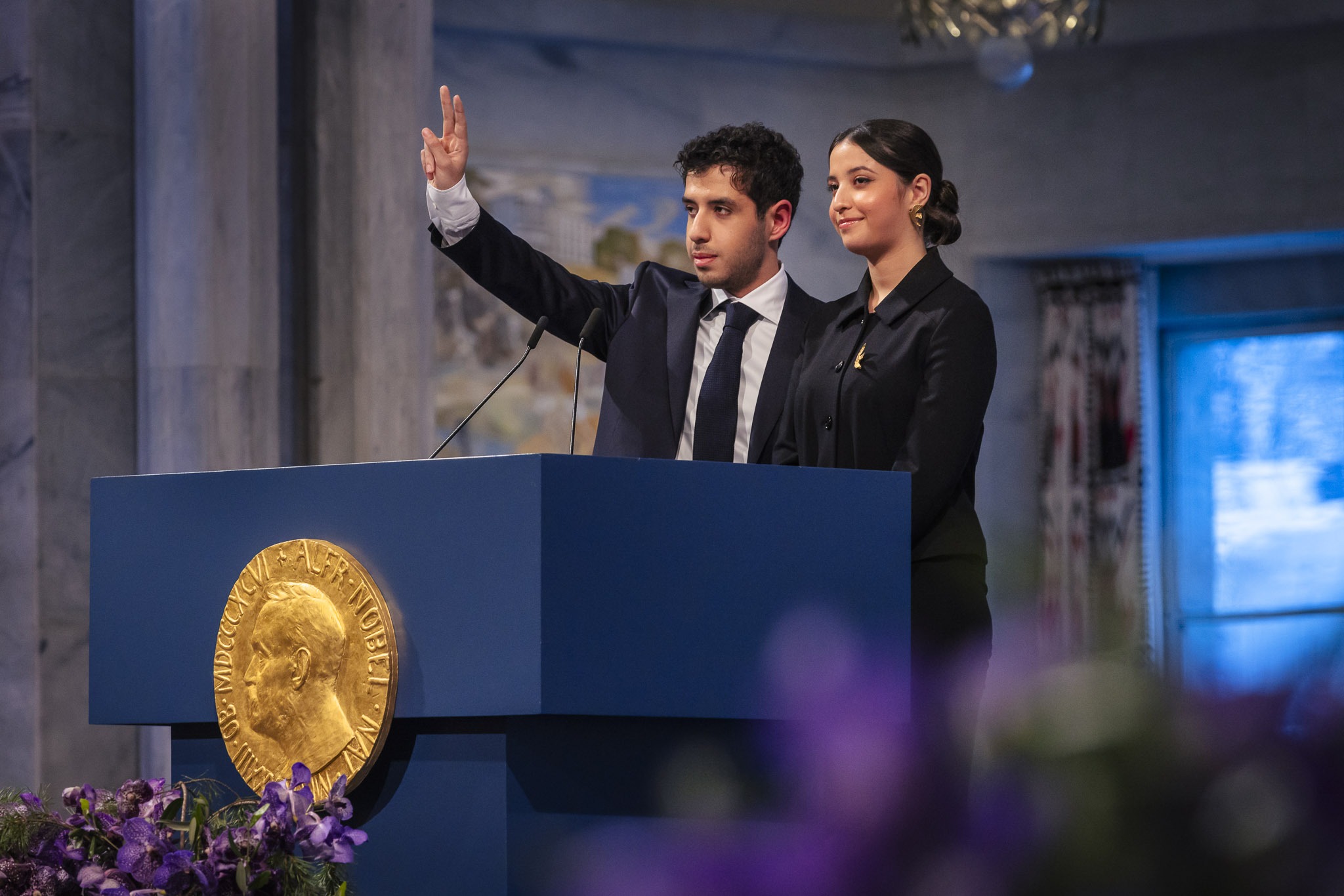
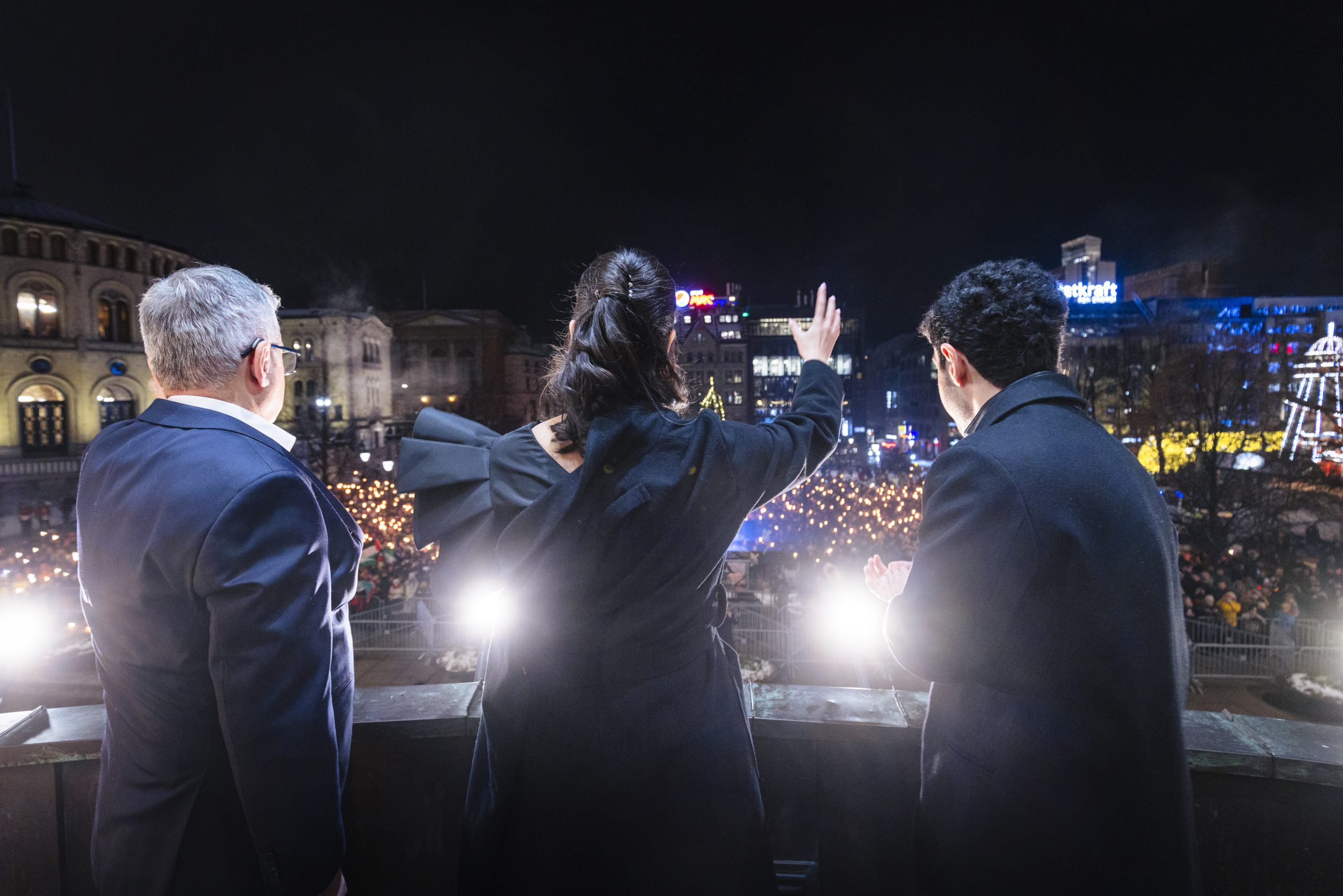
Narges Mohammadi was arrested in 2010 and was held in solitary confinement for weeks. She was sentenced to 11 years of imprisonment in the preliminary court, which was later reduced to 6 years in the appeal court. She went to serve the sentence in prison in 2012.
After being released on bail, in continuation of her activities, she founded Women’s Citizenship Center, an independent women’s organization. Because of the widespread executions in this period, she started working in the organization “Abolishing Death Penalty Step by Step”, which eventually led to another arrest in 2014.
In 2016, Narges Mohammadi was tried in prison and sentenced to 16 years, a sentence upheld by the appeal court. After being released on bail, she launched a campaign against solitary confinement and its effects, publishing two books and a documentary titled White Torture. She was arrested again in 2021 for her activism.
On 6 October 2023, Narges Mohammadi was awarded the Nobel Peace Prize “for her fight against the oppression of women in Iran and her struggle to promote human rights and freedom for all..” She was, however, once more unable to attend her own award ceremony as she was imprisoned in the Evin prison. Her 17 year old twins, Ali and Kiana, received the prize on behalf and read her speech at the ceremony held in her honor in Oslo in Dec 2023.
Narges Mohammadi kept receiving new charges after receiving the nobel peace prize and more pressure has been put on her by islamic republic regime new cases got open for her in court for letters she smuggled out of prison for Swedish and norwegian government and newspapers and for speaking out on sexual harassment in prison specially during the woman life freedom movement. Even her visitations and phone calls got cut from 29th Nov 2023.
Narges Mohammadi was finally granted a 21-day suspension from her prison sentence following surgery in mid-November, and was transferred home on 4 December 2024. Mohammadi was supposed to return to prison on 25 December, putting her health at significant risk, but chose to remain at home pending a legal appeal of the decision. On 31 December, the Legal Medicine Organization, a program under Iran’s Judicial Branch, reportedly approved the request and forwarded the decision to the prosecutor’s office.
Mohammadi’s doctors recently prescribed an extension of her medical leave for at least six more months to conduct thorough and regular medical examinations, including monitoring the bone lesion which was removed from her leg in November, physiotherapy sessions to recover from the surgery, and specialized cardiac care. Additionally, the medical team overseeing Mohammadi’s health has warned that her return to prison—especially under stressful conditions of detention and without adequate medical facilities—could severely worsen her physical well-being. Since her release in early December, Mohammadi has been targeted by a state-backed disinformation campaign pushing for her to be returned to jail – or even sent to a prison outside Tehran with unhygienic living conditions – in retaliation for her continuous human rights work and writing while in detention.
Narges Mohammadi's Journey
Short biography of Narges Mohammadi in audio
The Nobel Peace Center Student Challenge 2023
The winning entry was made by Siham Salim Sharif, Seyma Aysegül Yaman and Haleema Pervaiz, students at Stovner Upper Secondary School, and it was submitted by their teacher Silje B. Hvila.
The exhibited graphic short story was drawn by the award-winning illustrator and author Nora Dasnes based on the winning entry and made in cooperation with the students themselves. This story will be exhibited at the Nobel Peace Center in Oslo throughout March.
About the illustrator:
Nora Dasnes is a Norwegian illustrator and author. She has illustrated this year's Peace Prize graphic short story.
Global Collaboration: Nobel Peace Center & NRK Teach Narges Mohammadi's Fight for Freedom
The Nobel Peace Center and NRK Skole are teaming up to educate students worldwide about the 2023 Nobel Peace Prize laureate, Narges Mohammadi. Through free educational programs, students of all ages will learn about her inspiring fight for freedom and the ``Woman, Life, Freedom`` movement. This partnership expands digital lessons in Norwegian and English to reach a global audience, making vital lessons easily accessible to educators and learners everywhere. It's an opportunity to inspire the next generation to champion peace, liberty, and gender equality.The exhibited graphic short story was drawn by the award-winning illustrator and author Nora Dasnes based on the winning entry and made in cooperation with the students themselves. This story will be exhibited at the Nobel Peace Center in Oslo throughout March.
About the illustrator:
Nora Dasnes is a Norwegian illustrator and author. She has illustrated this year's Peace Prize graphic short story.

